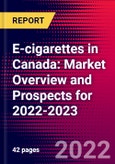Included in the report is also a research of price statistics for two categories of vaping products namely disposable pods and closed pod systems. The report contains a chapter on the recycling trends in the vaping sector. A detailed market competitors analysis is provided in the report. The report is summarized with an expert opinion providing general recommendations in the field.
Table of Contents
Executive Summary
On the regulatory level, the maximum nicotine concentration on the Canadian market is 20mg/ml; the capacity of e-liquid in disposable devices is not yet controlled or limited.More than 10% of smokers are dual-users, meaning they smoke and vape at the same time.
There's a good chance that non-tobacco or non-menthol flavors in e-liquids and e-cigarettes will be banned in the future, as well as reporting requirements and a limit on the maximum capacity of disposable e-cigarettes to 2ml.
The disposable pod market is constantly expanding. Disposables` capacity varies from 2 to 15 ml, although it is worth focusing on the benefits of 2 ml disposable pods, as greater capacity are at risk of being phased out.
Asd for the recycling direction, TerraCycle and Quantum Lifecycle Partners built specialized recycling solutions in Canada to protect developing e-cigarette and cannabis vape sectors from e-waste policies.
In Canada, the smoking products business primarily spills into the vaping sector.
The major engagements in this direction are constant monitoring of vaping regulation updates; using of a variety of mint-menthol flavors in the flavor palette; as a part of a long-term marketing strategy, collaboration with one of the recycling partners is seen as an important perspective.
Companies Mentioned
- Quantum Lifecycle Partners
- TerraCycle








